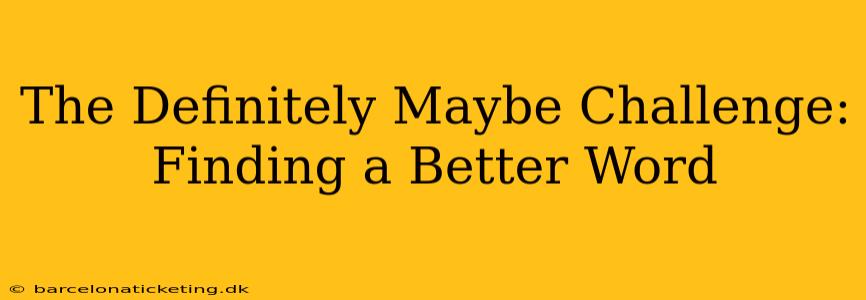The phrase "definitely maybe" is, let's face it, a bit of an oxymoron. It's a linguistic contortion, a verbal pretzel that attempts to express uncertainty while simultaneously asserting certainty. But why use such a clunky phrase when there are so many other, more precise ways to convey the same nuanced sentiment? This post explores the inherent contradiction of "definitely maybe," and offers a range of alternative word choices to help you communicate with clarity and precision.
What Does "Definitely Maybe" Even Mean?
The inherent problem with "definitely maybe" lies in its conflicting terms. "Definitely" implies absolute certainty, while "maybe" signifies uncertainty or possibility. The combination creates a jarring dissonance that leaves the listener (or reader) confused. It suggests a tentative affirmation, a hesitant agreement that borders on denial. It’s a verbal shrug, cloaked in the guise of decisiveness. This ambiguity can be problematic in various contexts, from casual conversation to professional communication.
Why You Should Avoid "Definitely Maybe"
Using "definitely maybe" weakens your communication. It muddies your message and can leave your audience unsure of your true intentions. Clear and concise language is essential for effective communication, and this phrase falls far short of that goal. Think about the impact it might have:
- In a professional setting: Using "definitely maybe" in a business proposal or meeting could undermine your credibility and make you appear indecisive.
- In a personal relationship: This phrase might be interpreted as dismissive or evasive, potentially hurting the other person's feelings.
- In any context: It simply sounds awkward and unprofessional.
Better Alternatives to "Definitely Maybe"
So, what are the better alternatives? The best choice will depend on the specific context and the nuance you wish to convey. Here are a few options, categorized for clarity:
Expressing High Probability:
- Likely: This word implies a strong possibility, suggesting a higher chance of something happening than not. Example: "It's likely we'll go to the beach this weekend."
- Probably: Similar to "likely," this indicates a high degree of probability. Example: "We'll probably attend the conference."
- Most likely: This strengthens the probability even further. Example: "It's most likely she'll accept the offer."
Expressing Uncertainty with a Lean Towards Yes:
- Perhaps: This conveys a gentle uncertainty, suggesting a possibility without strong commitment. Example: "We might go out for dinner; perhaps Italian."
- Possibly: This is similar to "perhaps," offering a less definite affirmation. Example: "Possibly, we could work on the project this afternoon."
- I'm leaning towards yes: This is a more direct way of conveying a positive inclination while still acknowledging some uncertainty.
Expressing Uncertainty with a Lean Towards No:
- I'm not sure: This is a straightforward way to express doubt. Example: "I'm not sure I can make it to the party."
- It's unlikely: This suggests a lower probability of something happening. Example: "It's unlikely that we will finish the project by Friday."
- I doubt it: This is a stronger expression of doubt, indicating a low probability. Example: "I doubt it will rain tomorrow."
Addressing the "People Also Ask" Questions:
What's a better way to say "maybe"? The best alternative to "maybe" depends on the context. Consider alternatives like "perhaps," "possibly," "possibly not," "it's uncertain," or a more direct "yes" or "no" if you can provide a more definitive answer.
Is "definitely maybe" grammatically correct? While grammatically correct in the sense that it uses acceptable words, the phrase is semantically contradictory. It's not incorrect grammar, but it's poor usage because of the contradictory meaning.
What's the opposite of "definitely maybe"? The opposite depends on the intended meaning. If "definitely maybe" means a leaning towards yes, the opposite would be a strong "no" or "definitely not." If it implies weak uncertainty, the opposite might be a clear "yes" or "no" depending on the actual situation.
Conclusion: Choose Clarity Over Cleverness
In the end, the best approach is to avoid "definitely maybe" altogether. Choose words that accurately reflect your meaning and convey your message with clarity and precision. Clarity trumps cleverness every time in effective communication. By selecting more precise language, you'll avoid confusion, build stronger relationships, and improve your overall communication skills.

